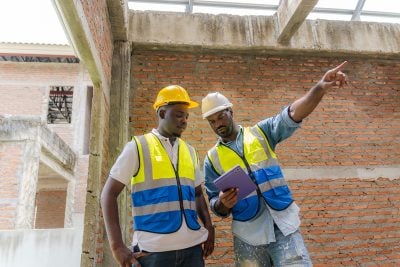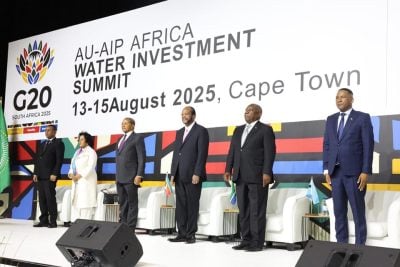South Africa, the continent’s most industrialised and diverse economy, will be flying its flag high at the World Economic Forum meeting in Davos, highlighting the country as a competitive business and investment destination and a country on the move.
The annual meeting in Switzerland, a global platform to drive public-private cooperation, gives South Africa a chance to add its voice to discussions about global issues and join other leaders in shaping global, regional and industry agendas, says Sithembile Ntombela, Acting CEO of Brand South Africa, the country’s official marketing agency.
The event also enables political and business leaders to speak about opportunities in South Africa across sectors, and position the country as a vital investment destination and gateway to growing economies in Southern Africa, she says.
The South African delegation will be led by the Minister of Finance, Enoch Godongwana, with ministers invited from Trade, Industry and Competition; Higher Education, Science and Innovation; Communications and Digital Technologies; and Electricity and Health.
Also present in Team South Africa alongside Brand South Africa will be a number of its business partners, including financial services group Old Mutual and Standard Bank alongside global brewing giant, the AB InBev Group. They will join hundreds of participants drawn from governments across the world, international organisations, global companies, civil society and the international media.
The companies will showcase their own efforts to uplift people, drive inclusion and create employment and opportunities through their investments, while also positioning South Africa as a springboard into the rest of Africa.
Team SA will showcase the successes and achievements across many areas of the economy to give investors an informed view of developments in the country, says Ntombela.
The South African delegation will also provide updates on ongoing structual reforms, particularly in the energy and logistics sectors, as well as highlight efforts to drive economic recovery through strategic investments.
South Africa’s economy is undergoing a fundamental transformation that will make it more competitive, inclusive, and capable of growth. This is being done under the umbrella of Operation Vulindlela, which was initiated by President Cyril Ramaphosa in 2020 as part of the Economic Reconstruction and Recovery Plan. It aims to modernise and transform network industries, including electricity, water, transport and digital communications, areas that are critical to building a globally competitive economy.
In addition, reforms to the visa regime are being prioritised to attract skills and promote growth in tourism.
Through these reforms, South Africa is steadily laying the foundation for a revival of economic growth to ensure that investors continue to see value in the South African economy.
In 2023, the Cabinet approved the new South Africa Investment Strategy, which focuses on developing strong partnerships between the public and private sectors, fostering collaboration, and leveraging resources to maximize the developmental impact of investments.
Priority sectors
Key among sectors to be highlighted at the WEF meeting is energy. South Africa, in pursuit of a just transition away from fossil fuels, is seeking sustainable development-driven solutions to ensure access to electricity for its growing population and industrialised economy while still working hard to address current challenges in its national grid.
Its comprehensive Just Energy Transition Implementation Plan lays out the way forward but also necessitates collaboration with global partners, in finance, capacity building amongst other ways.
But while it embarks on this journey, the South African government is committed to ensuring that workers and communities in affected industries are not left behind. It believes the transition must be based on the principles of equity and differentiation, allowing for differentiated pathways.
Developed countries are creating space for regions such as Africa to pursue sustainable development pathways and find ways to leverage their natural resources.
However, there are other potential challenges. South Africa is mindful that the journey to net zero globally raises challenges for African trade, for example, the introduction of carbon border tax adjustments on imports and other measures.
This may also have an impact on an initiative of great importance to South Africa and other African nations – the African Continental Free Trade Area (AfCFTA), which is set to create the largest free trade area in the world and lift millions of Africans out of extreme poverty.
Current trade in commodities from South Africa and other African States have a significant carbon footprint, which may be an impediment to unlocking trading opportunities with some of our main trading partners such as Europe, the US and the UK. The WEF meeting provides South Africa with an opportunity to raise these concerns.
Another priority for South Africa, which will be raised in Davos, is the country’s journey to becoming a digital economy. The government remains committed to implementing the recommendations contained in the Presidential Commission on the Fourth Industrial Revolution report.
These include initiatives such as digital skills training, building digital infrastructure and developing an Artificial Intelligence National Plan. International investment and collaboration is key to the success of this plan.
South Africa also has a comprehensive national policy framework for the development of a knowledge economy, the Decadal Plan for Science, Technology and Innovation. This aims to enable public-private partnerships in priority investment areas such as the building of digital or circular economies, as well as modernising agriculture, manufacturing, and mining through innovation.
There are undoubtedly challenges ahead, with low domestic growth forecast amid an uncertain global outlook.
The world continues to face geopolitical risks stemming from the conflicts in Ukraine and the Middle East, Russia’s Black Sea Grain Initiative withdrawal, China’s property sector challenges, supply shocks, climate change, oil supply cuts by OPEC+ countries, and slowing global activity owing to further global monetary policy tightening.
South Africa is pursuing a fiscal policy focused on strengthening public finances and boosting GDP growth by improving electricity and rail operations, building investor confidence, attracting new infrastructure investment and speeding up service delivery, as well as reconfiguring the state for efficiency.
Business Engagement
The private sector remains a key partner in economic growth and the state is committed to improving the business climate for both local and international companies operating in the country.
Initiatives under way include reducing data costs and improving broadband access; making tax compliance easier; reducing the timeframes for issuing licences in key areas of opportunity such as mining, water and the environment; unlocking potential in upstream oil and gas; cutting red tape, and dealing decisively with crime and corruption.
South Africa will also again raise its voice in pursuit of the reform of global multilateral institutions to include a push for the greater participation of countries of the Global South in terms of access to finance, supply chains, trade and investment opportunities.
Private sector voices will add to the South African investment story.
Sim Tshabalala, CEO of the Standard Bank Group, says South Africa is the best place to be based if you want to buy into Africa as a whole.
“Only South Africa can provide the necessary combination of deep and liquid markets, sound macro policy, legal certainty, Africa expertise, and world-class managerial and technical know-how.
“And international investors do very much want to buy into Africa, given our uniquely favourable demographics, immense natural resources, potential for low-cost industrialization and last, but certainly not least, increasing market integration under the African Continental Free Trade Area.”
Old Mutual CEO Iain Williamson said the company would be using the WEF platform to raise important issues that affect companies. “Our key message is that collaboration is the key to fixing our fragmented world and challenges that range from global stagflation to the climate crisis and beyond. No one player can do this alone.
“As an organisation, we are ready to play our part in effecting the changes needed. The financial services sector has an increasingly critical role to play in creating access, driving inclusion, and responsibly supporting the millions of people who depend on us every day,” he says.
AB Inbev CEO Richard Rivett-Carnac highlighted the company’s strong commitment to contributing to domestic growth and value addition through its local subsidiary, South African Breweries, which is home to some of the country’s best-known brands.
“We firmly believe in the power of local sourcing to stimulate growth and our manufacturing value chain is very much localised. About 95% of our raw materials are locally sourced and the jobs and taxes that we are able to generate are all from South Africa, linking our product closely to local economies and communities.
“In our partnership with Brand South Africa, we will be engaging in discussions and looking for meaningful ways to really drive positive economic development, especially on the African continent.
“At a moment when South Africa’s economy seems to be on the cusp of recovering, our socio-economic footprint highlights our potential to invigorate the economy by leading and growing our category.
“Beer matters, for the economy, job creation, and the success of a wide array of partners along our value chain.”
This article was produced with the support of Brand South Africa
Want to continue reading? Subscribe today.
You've read all your free articles for this month! Subscribe now to enjoy full access to our content.
Digital Monthly
£8.00 / month
Receive full unlimited access to our articles, opinions, podcasts and more.
Digital Yearly
£70.00 / year
Our best value offer - save £26 and gain access to all of our digital content for an entire year!

 Sign in with Google
Sign in with Google 



